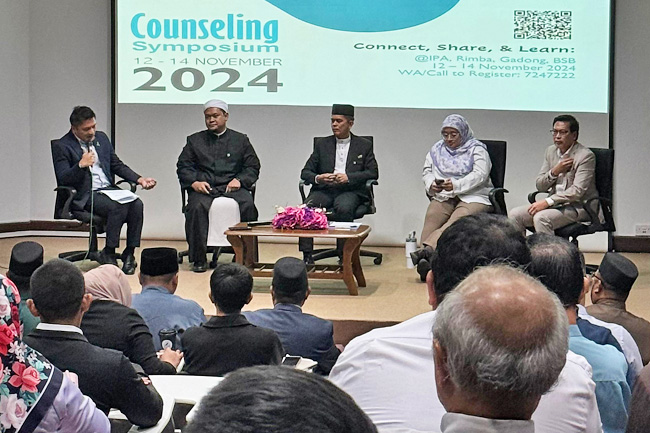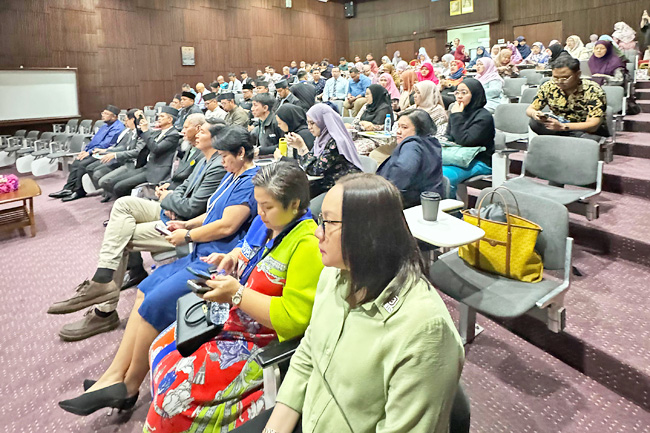The Sultanate is placing greater emphasis on addressing mental health issues, spurred by a series of titahs from His Majesty Sultan Haji Hassanal Bolkiah Mu’izzaddin Waddaulah ibni Al-Marhum Sultan Haji Omar ‘Ali Saifuddien Sa’adul Khairi Waddien, Sultan and Yang Di-Pertuan of Brunei Darussalam, throughout the year.
His Majesty underscored the critical role of community-based support in tackling mental health concerns, which have been exacerbated by the COVID-19 pandemic. This focus on grassroots initiatives was a central theme at the recent International Counselling Symposium 2024.
Held earlier this month, the symposium, organised by the Brunei Darussalam Counselling Association (PERKAB), centred on the theme ‘From Awareness to Action: Empowering Grassroots with Counselling Skills to Address Mental Health Challenges’.
The event brought together village heads, teachers, youth leaders, and government officials, united in their mission to enhance mental health awareness and support within local communities. It forms part of a broader national initiative to tackle mental health challenges across all levels of society.
By equipping grassroots leaders with counselling tools to become ‘paracounsellors’, the symposium aims to create a ripple effect that reaches every corner of the country. PERKAB seeks to build a network of community leaders who are mentally health-literate and capable of providing early support to those in need.
Local experts shared valuable insights during the event, addressing critical themes such as grassroots leadership and spiritual practices. These discussions deepened participants’ understanding of mental health support while emphasising the importance of resilience.
MOBILISING GRASSROOTS LEADERS FOR MENTAL HEALTH SUPPORT
Major (Rtd) Rusli bin Bujang emphasised the vital role grassroots leaders play in bridging mental health support gaps.
His presentation focused on the power of mobilisation at the community level, showcasing how leaders can help raise awareness, reduce stigma, and connect individuals with essential mental health resources.
The session highlighted practical strategies that leaders can adopt to recognise mental health needs and effectively respond to them, creating ripple effects throughout underserved communities.


COMPASSIONATE LEADERSHIP: A PATH TO PROSPERITY
Dr Hajah Salwa binti Dato Seri Setia Haji Mahalle discussed the connection between leadership and community prosperity, especially through the lens of Islamic teachings.
She explained how leaders, entrusted by Allah the Almighty, must guide their societies with values of justice, equality, and compassion. Effective communication, which builds trust and strengthens bonds between leaders and their communities, was noted as a key characteristic of successful leadership.
COUNSELLING SKILLS FOR GRASSROOTS LEADERS
Zaimah binti Haji Abdullah and Hajah Siti Azizah binti Haji Wahsalfelah led a session on counselling skills tailored for grassroots leaders.
The workshop introduced essential counselling techniques, including empathy, active listening, and reflection of feelings. These skills, they argued, are crucial for building positive interpersonal relationships and ensuring that grassroots leaders can provide effective support to those in need, be it as counsellors or mentors.
INTEGRATING COGNITIVE BEHAVIOURAL THERAPY (CBT) FOR MENTAL HEALTH SUPPORT
Noor Azimah Sulaiman explored the integration of Cognitive Behavioural Therapy (CBT) in community-based mental health practices.
Her session highlighted the importance of evidence-based therapies in managing conditions such as anxiety, depression, and stress. Participants were introduced to CBT’s core principles and how they can be applied in everyday community mental health interventions to promote better psychological well-being.
BUILDING THERAPEUTIC RELATIONSHIPS FOR IDEAL SELF-FORMATION
Ali Hardi bin Awang Haji Mohamed delved into the concept of the therapeutic relationship as the foundation for personal growth and transformation. His session focused on the key aspects of building an authentic, empathetic, and supportive relationship between counsellors and clients.
These interactions, he argued, are crucial for fostering ideal self-formation, enhancing professional skills, and ultimately contributing to a more balanced and effective counselling practice.
CAPACITY BUILDING IN COUNSELLING PRACTICES
Haji Saharuddin bin Haji Petra addressed the concept of capacity building within the counselling sector. Drawing from Islamic principles, he emphasised the importance of continuous development in counselling, noting that the Whole of Counselling Approach (WOCA) aims to synchronise efforts and improve services.
His research also highlighted the development of Key Performance Indicators (KPI) for counselling services, emphasising the need for a clear roadmap in enhancing the quality and effectiveness of mental health support in the community.
FOSTERING RESILIENCE AND MENTAL HEALTH
Haji Amir Shukri bin Haji Zawawi’s session on resilience explored the theory behind “bouncing back” from adversity. His lecture outlined how resilience is a skill that can be nurtured both individually and organisationally. By creating supportive environments and offering resilience training, organisations can equip individuals to better handle stress and challenges, ultimately leading to improved mental health and stronger communities.
MENTAL HEALTH EDUCATION FOR A STIGMA-FREE SOCIETY
Dr Deeni Rudita bin Idris underscored the importance of mental health education in breaking societal stigma and fostering open discussions about mental well-being.
Her session encouraged participants to create support systems within communities and highlighted the role of educators, families, and social groups in providing essential mental health knowledge to the wider public.
THE HEALING POWER OF ART THERAPY
Hajah Suzilawati binti Haji Md Saji’s introduction to art therapy as a tool for community-based mental health support offered an innovative approach to well-being.
By using creative expression, art therapy provides a safe space for individuals to explore their emotions and experiences, thus promoting healing and personal growth.
SPIRITUAL PRACTICES AS TOOLS FOR MENTAL WELLBEING
Fariszal bin Ali closed the series of sessions with a reflection on the power of dikir and spiritual practices in promoting mental tranquility.
Drawing from Al-Quran, Fariszal highlighted the importance of remembrance and connection to Allah the Almighty in achieving emotional balance and stress relief. He stressed that spiritual practices could be key in supporting community mental health and fostering a peaceful, supportive environment. – Rizal Faisal




